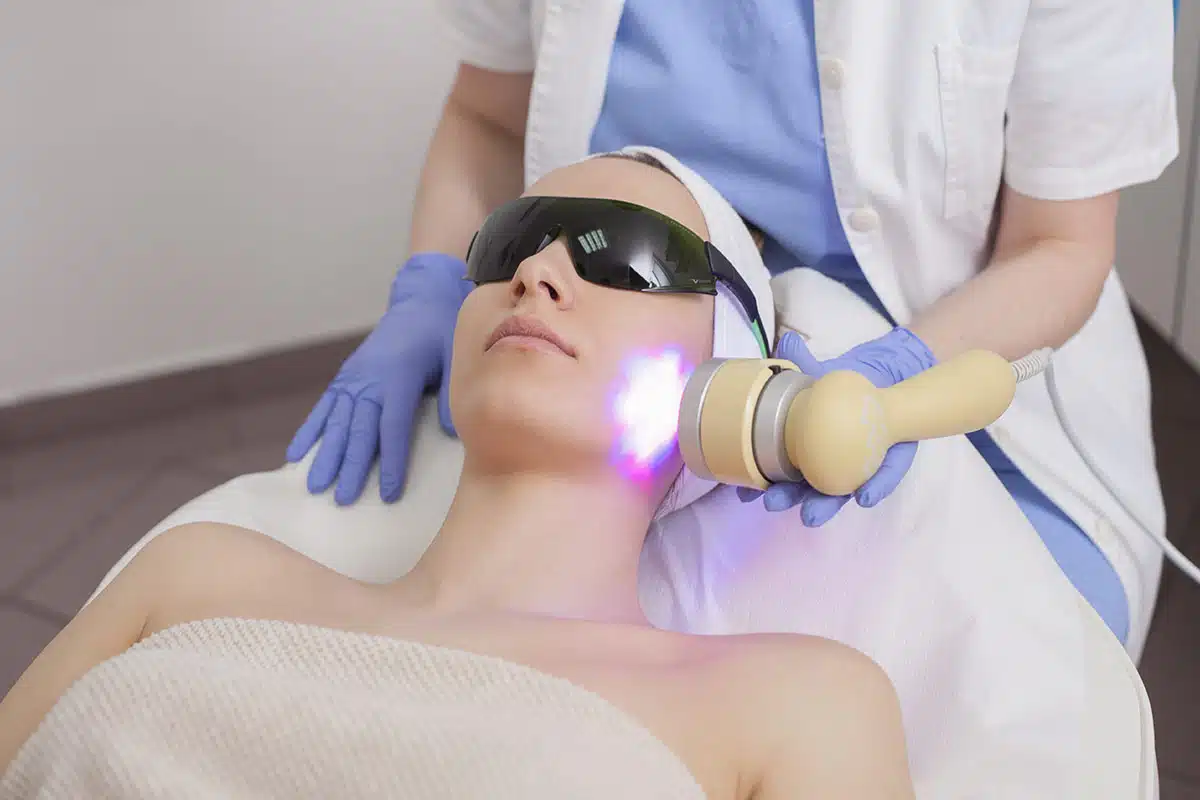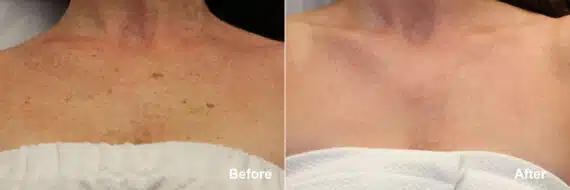Have you been considering IPL (Intense Pulsed Light) therapy to rejuvenate your skin, fade sunspots, or treat redness? It’s no surprise—this non-invasive treatment has become a go-to solution for those looking to improve their skin tone and texture without the downtime of surgery.
But like any cosmetic procedure, IPL comes with its share of risks and side effects. If you’re curious about what to expect after an IPL photofacial—and how to minimize potential complications—read on. This guide will walk you through everything you need to know before your first session.

Do IPL Treatments Have Long-Term Effects?
For most patients, IPL treatments do not result in long-term side effects. Temporary redness, swelling, or mild discomfort are common but typically subside within a few hours to a few days. Rarely, some individuals may experience prolonged pigmentation changes, scarring, or sensitivity. These outcomes are often linked to improper treatment settings, lack of post-care, or pre-existing skin conditions. Choosing a skilled provider significantly reduces the chances of long-term complications.
Common Side Effects and Risks of IPL Photofacial Treatments
While IPL is widely considered safe when performed by a qualified professional, it’s important to understand the potential side effects associated with the treatment. Every individual’s skin reacts differently, and knowing what to expect can help you make informed decisions and feel more confident about your IPL procedure. Below, we’ll outline some of the most common risks patients may experience.
Redness and Skin Burns
One of the most common reactions after an IPL session is temporary redness and a sensation similar to a mild sunburn. This can be accompanied by mild discomfort and increased skin sensitivity, especially in the first few hours following treatment. In rare cases, if the IPL device is not calibrated properly or the skin is overly exposed to light, minor burns may occur. These typically resolve on their own, but post-treatment care is essential to minimize inflammation and prevent complications.
Infections
Although infections are uncommon after an IPL procedure, they can occur if the skin is not properly cared for during the healing process. Open pores or minor abrasions from the treatment can provide an entry point for bacteria. To reduce this risk, patients should avoid touching the treated area with unwashed hands, refrain from using contaminated cosmetics, and follow all aftercare instructions carefully. If you notice unusual swelling, pus, or increasing pain, contact your provider immediately for evaluation and treatment.
Blistering and Scarring
Blistering is a less common but possible side effect of IPL treatments, especially when higher energy levels are used or the skin is overly sensitive. These blisters may resemble small, fluid-filled bumps that typically heal within a few days if left undisturbed. However, improper care or scratching can increase the risk of scarring. Scarring is rare but can occur if the skin’s healing process is disrupted. Prompt attention to post-treatment care instructions plays a key role in preventing long-term marks or textural changes.
Hyperpigmentation
Hyperpigmentation is one of the more noticeable possible side effects of IPL therapy, particularly for individuals with darker skin tones. This condition involves patches of skin discoloration where melanin production becomes uneven, leading to darker or lighter areas after treatment. While usually temporary, these changes can last for weeks or months, depending on your skin’s sensitivity and how well aftercare instructions are followed. Choosing the right settings for your specific skin tone and avoiding sun exposure post-treatment are essential in minimizing the risk of discoloration.


Trust your face to a specialist
My Goal is to create Harmony, Balance & true Beauty
How Can I Reduce the Risks of IPL Therapy?
Taking the right steps before and after your IPL treatment can make a big difference in the healing process and help you avoid unwanted complications. While side effects are often mild, being proactive with your care routine significantly lowers your risk of irritation or damage. Here are some simple lifestyle habits and aftercare tips that can help support your skin’s recovery and ensure better results.
Limit sun exposure
After undergoing IPL therapy, your skin becomes more vulnerable to ultraviolet rays, which can intensify sensitivity and increase the risk of complications. Excessive sun exposure may reverse the benefits of your treatment and lead to unwanted sun damage or pigmentation changes. To protect your skin, apply a broad-spectrum sunscreen daily, wear protective clothing, and avoid direct sunlight as much as possible during the healing phase. These precautions are essential to maintaining your results and preventing irritation or discoloration.
Avoid using harsh chemicals
During the recovery period after your IPL treatment, it’s crucial to steer clear of skincare products containing harsh chemicals like retinoids, glycolic acid, or alcohol-based formulas. These ingredients can irritate freshly treated skin, delay the healing process, and increase the risk of inflammation or adverse reactions. Instead, opt for gentle, fragrance-free products that support barrier repair and hydration. Always consult your provider before reintroducing active ingredients to your routine.
Gentle skincare routine
Following an IPL procedure, your skin needs time to recover, so it’s best to stick with a gentle skincare routine. Use mild, non-abrasive cleansers and moisturizers that are free of fragrances and harsh ingredients. Avoid exfoliating products, scrubs, or anything that could irritate the skin while it’s still sensitive. A calming, hydrating routine helps maintain your skin’s barrier function and speeds up recovery, ensuring smoother, longer-lasting results from your treatment.
Get enough rest
Getting plenty of rest after an IPL treatment allows your body to dedicate more energy to skin regeneration. Sleep plays a vital role in cellular repair, helping your skin recover more quickly and evenly from the procedure. Fatigue can compromise the immune system and slow down the healing process, increasing your vulnerability to irritation and uneven results. Prioritize a regular sleep schedule and create a calming nighttime routine to support optimal recovery.
Hydrate yourself
Proper hydration is essential for skin recovery following an IPL session. Drinking enough water helps flush out toxins, promotes cellular repair, and keeps your skin looking fresh and balanced. Dehydrated skin may take longer to heal and is more prone to irritation and flakiness. Aim to drink plenty of water throughout the day, and consider using a hydrating serum or moisturizer to support your skin from the outside as well. Well-hydrated skin heals faster and responds better to treatment.
Maintain a healthy diet
A well-balanced diet plays a supportive role in your skin’s healing and overall appearance after IPL treatment. Nutrients such as vitamins C and E, antioxidants, and omega-3 fatty acids can help repair tissue, reduce inflammation, and promote skin resilience. Avoid processed foods and prioritize fruits, vegetables, lean proteins, and healthy fats to nourish your skin from within. By maintaining a healthy diet, you provide your body with the tools it needs to recover faster and enhance treatment results.
IPL before & after photos
* All patients are unique and individual results may vary.
Choosing an Expert in Facial Procedures
When it comes to IPL treatments—or any light- or laser-based skin procedure—experience matters. An experienced facial specialist understands how to evaluate your skin type, customize settings, and provide aftercare guidance that helps you heal faster and achieve optimal results. Choosing a board-certified expert dramatically reduces the risk of complications and ensures your treatment plan is aligned with your unique skin goals.
Dr. Nicole Schrader is a double board-certified facial plastic surgeon with over 20 years of experience in aesthetic and reconstructive procedures. Her practice, Schrader Plastic Surgery, is rooted in personalized care and cutting-edge techniques. Dr. Schrader’s expertise in skin and facial treatments makes her the ideal choice for IPL therapy. Ready to enhance your skin safely and effectively? Call us today at 609-279-0009 or visit our contact page to schedule a consultation.


